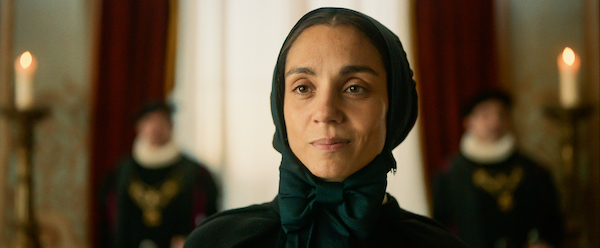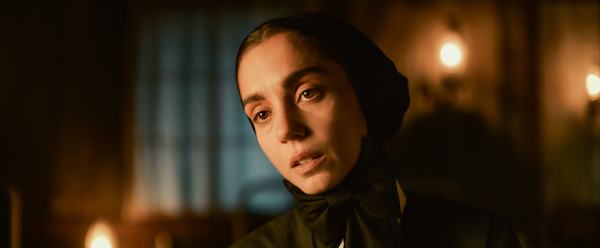
An ambitious day of biking will take me up the spine of Manhattan, from 6th Avenue past Central Park and up St. Nicholas to Edgecombe Avenue. At the Highbridge swimming pool I head west to Fort Washington Avenue, climbing that to Bennett Park, the high point of the island.
Just beyond is Cabrini Boulevard, which curls around a nature sanctuary to Fort Tryon Park and the Cloisters, passing along the way a charter school, a Montessori academy, an immigrant center, and the St. Frances Cabrini Shrine. All are named for Francesca Cabrini, the subject of Cabrini.
It’s a different world from Midtown, unfolding at a slower pace, with expansive views, forests, gardens, playgrounds, and walking trails. People stop, sit, and absorb their surroundings. They don’t need to know anything about the first US citizen to be canonized to appreciate something of what she accomplished. Although she died in 1917, her influence is inescapable in the neighborhood. I’ve attended services in churches named for her, and was a patient in a Cabrini hospital.
Like Cabrini herself, the movie is forceful and efficient, dismissing with nuance and pleasantries to focus on obvious goals and messages. Rod Barr’s screenplay, never subtle, manages to avoid almost any mention of doctrine or scripture. Alejandro Monteverde’s direction is flamboyantly baroque, cameras swirling around characters while choirs ascend on the soundtrack. He pushes too hard to elevate his lead, who despite her ambition was resolutely down-to-earth.
And that’s how Cristiana Dell’Anna plays her, as a no-nonsense, if sickly, reformer who will not take no for an answer. She goes up against the Roman Catholic Church hierarchy, tangling with the Pope (a saintly Giancarlo Giannini) in Rome and an Archbishop (David Morse) in New York, before taking on politics in the form of Mayor Gould (played by John Lithgow as Jeff Daniels).

Cabrini battles pervasive anti-Italian sentiments as well as deep-rooted biases against women. She convinces realtors to sell her buildings, children to leave the streets, and celebrities to support her causes. She even persuades prostitutes to dig wells.
As a woman who founded close to 70 missions serving orphans, immigrants, and the sick and poor, Cabrini’s impact on the world was profound. Cabrini the movie focuses on how difficult it was for her to operate in a society that didn’t respect her, in the process ignoring just what made her such a magnetic and revolutionary figure.
Still, the movie does bring attention to someone who made the world better for a deserving underclass. And by downplaying religious aspects of the story, the filmmakers don’t have to include discussions about good and evil, or arguments about Christ and the poor. It’s almost like the Holy Church of Christ Without Christ in Wise Blood.
(It’s also a New York movie without New York. The streets, slums, views, and architecture are inaccurate at best, especially alleys that lead to bluffs and wide lawns in front of municipal buildings. Shooting took place in Buffalo and Italy.)
We can’t ignore Monteverde’s and Angel Studio’s earlier project, the sex-trafficking melodrama Sound of Freedom. A fictionalized account of Tim Ballard, later accused of sexual assault, the film became associated with QAnon conspiracies. Maybe that’s why Cabrini seems to avoid religion as much as possible in a story that deals so heavily with the Roman Catholic Church.
In that sense Cabrini follows in the grand tradition of movies like Brigham Young, a biopic of the church elder that glided over every controversial aspect of Mormonism.
Sound of Freedom should not have any impact on whether or not Cabrini is a good movie. Nor should its religious messages, or lack thereof. What’s important is that Cabrini is a sincere account, told with grace and impressive production values, of someone who made a difference.
Credits: Directed by Alejandro Monteverde. Screenlay by Rod Barr. Director of photography: Gorka Gómez Andreu. Edited by Brian Scofield. Music by Gene Black. Production design: Carlos Lagunas. Cast: Cristiana Dell’Anna, John Lithgow, Romana M. Vergano, David Morse, Giancarlo Giannini, Virginia Bocelli, Frederico Ielapi.
Photos courtesy Angel Studios.


